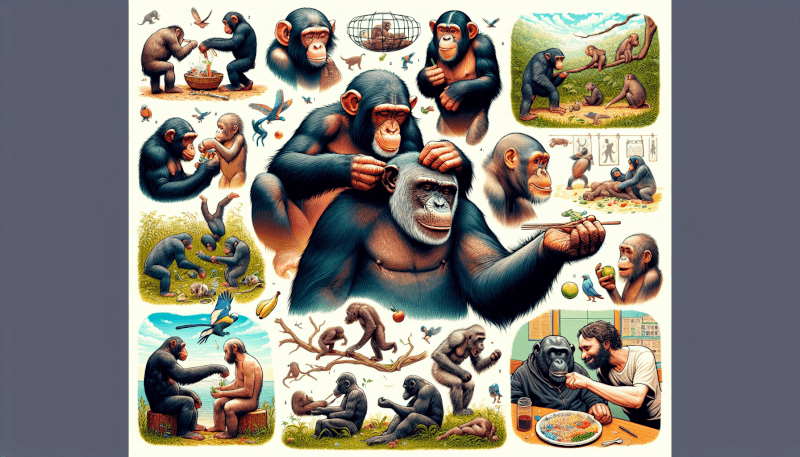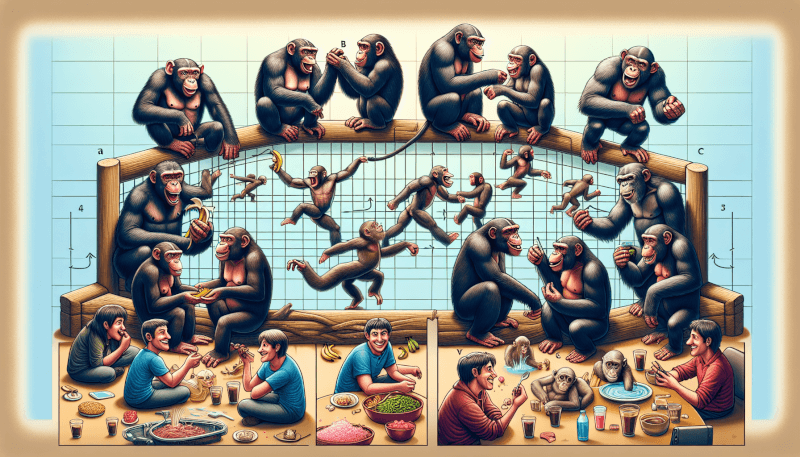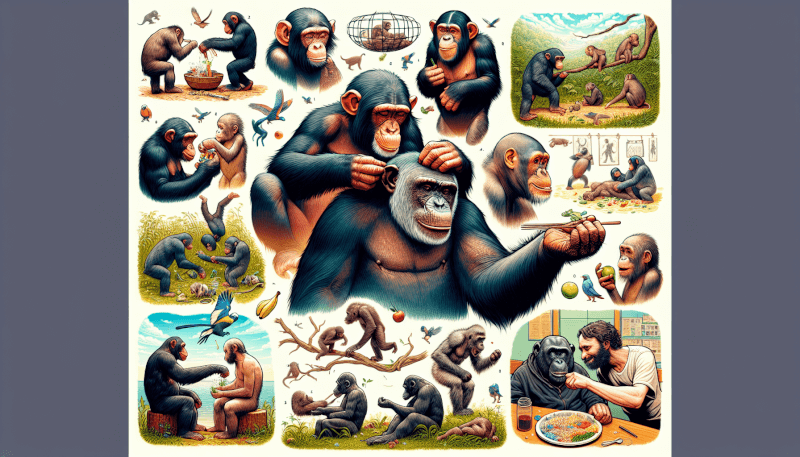In the captivating world of primate social networks, friendships play a vital role in shaping the dynamics within these complex communities. As individuals forge connections based on shared interests and affiliations, friendships become the glue that binds groups together, fostering cooperation, trust, and emotional support. These friendships not only provide a sense of belonging but also contribute to the overall stability and well-being of primate societies. From chimpanzees to baboons, the role of friendships in primate social networks is a fascinating aspect that unveils the intricacies of their relationships.
The Role of Friendships in Primate Social Networks

1. Introduction to Primate Social Networks
Primate social networks refer to the intricate webs of social relationships that exist within populations of primates, including monkeys, apes, and humans. These relationships shape the social dynamics and behaviors of individuals within a group, and friendships play a crucial role in these networks. Friendships are unique social relationships characterized by trust, mutual support, and regular positive interactions. Understanding the role of friendships in primate social networks is essential for unraveling the complexities of primate societies and gaining insights into the nature of human relationships.
2. Types of Primate Social Networks
Primate social networks can vary depending on the species and environmental factors. Some common types of primate social networks include one-male-multi-female/multi-male-multi-female networks, fission-fusion networks, multi-level networks, and various other network structures. Each type of social network has its own unique set of social interactions, dominance hierarchies, and group compositions. The understanding of different types of primate social networks provides valuable context for examining the role of friendships within these networks.

3. Understanding Friendships in Primate Social Networks
Friendships in primate social networks can be defined as strong social bonds that form between individuals within a group. These relationships are characterized by a shared history of positive interactions, emotional support, and trust. Distinguishing friendships from other social relationships, such as kinship bonds or affiliations, can be challenging, but the presence of long-term, non-kin relationships with consistent affiliative behaviors is a strong indicator of friendship. Ethologists and primatologists use behavioral indicators, such as grooming, play, and proximity, to identify and understand the dynamics of friendships among primates.
4. Functions of Friendships in Primate Social Networks
Friendships in primate social networks serve various important functions for individuals and their groups. One of the key functions is social bonding and emotional support. Friendships provide individuals with a sense of security, comfort, and companionship, which helps to reduce stress and increase overall well-being. Additionally, friendships facilitate cooperation and coalition formation among individuals, leading to increased group cohesion and survival. Friendships also play a crucial role in information exchange and social learning, enabling individuals to acquire new skills and knowledge through observation and imitation. Moreover, friendships can be influenced by kinship and genetic relatedness, as individuals are more likely to form and maintain friendships with close relatives. Lastly, friendships serve as a mechanism for conflict resolution and mediation, helping to mitigate disputes within the social group.

5. Formation and Maintenance of Primate Friendships
The formation and maintenance of friendships in primate social networks are influenced by various factors. Proximity and affiliation are essential in the initial stages of friendship formation, as individuals need to spend time together and engage in positive social interactions to establish a bond. Reciprocity and mutual interests also play a role, as friendships are often built on mutual benefit and shared experiences. The longevity and stability of friendships are influenced by the age and developmental stage of individuals, with long-standing friendships being more common among adult individuals. Additionally, social structures and hierarchies within primate groups can impact friendship dynamics, as individuals may form friendships based on their social status or preferential associations.
6. Factors Influencing Friendship Dynamics in Primate Social Networks
Various factors can influence the dynamics of friendships in primate social networks. Species-specific factors, such as social organization, mating systems, and ecological constraints, can shape the formation and maintenance of friendships. Environmental factors, including resource availability, habitat structure, and predation risk, can also influence friendship dynamics by affecting social interactions and group dynamics. Individual characteristics, such as personality traits and social skills, can play a role in the establishment and maintenance of friendships. Additionally, social hierarchies and dominance relationships within primate groups can impact friendship dynamics as individuals may form friendships with higher-ranking individuals to gain social benefits.

7. Benefits of Friendships in Primate Social Networks
Friendships in primate social networks offer several benefits for individuals and their groups. Enhanced survival and reduced predation risks are one of the primary benefits. Friendships provide individuals with support and protection during times of danger, increasing their chances of survival. Friendships also enable access to resources and increased foraging success, as individuals in friendships may cooperate and share information about food sources. In terms of reproduction, friendships can contribute to increased reproductive success by providing individuals with enhanced access to mates and potential allies in conflicts over mating or resources. Furthermore, friendships improve social integration and group cohesion by fostering positive social interactions and reducing aggression within primate groups.
8. Costs and Risks Associated with Friendships in Primate Social Networks
While friendships offer numerous benefits in primate social networks, there are also costs and risks associated with these relationships. Time and energy investment are necessary to maintain friendships, which may divert resources from other essential activities such as foraging or mating. Competition and conflict can arise within friendships, especially when individuals have conflicting interests or access to limited resources. Friendships also pose a risk of disease transmission, as close physical contact and grooming behaviors can facilitate the spread of pathogens within primate groups. Additionally, friendships can make individuals vulnerable to social manipulation, as individuals may exploit the trust and emotional bonds within friendships for personal gain or dominance.

9. Role of Friendships in Primate Reproduction
Friendships play a significant role in primate reproduction by influencing mating strategies, parental investment, and mate choice. Within primate social networks, friendships can provide individuals with increased opportunities for mating by facilitating access to potential mates and reducing mate competition. Friendships may also influence parental investment, as friends may assist in childcare or provide support to parents, increasing the chances of offspring survival. Additionally, friendships can have an impact on mate choice, as individuals may prefer to form long-term relationships with their friends based on their prior positive interactions and emotional bonds.
10. Comparative Perspectives: Friendships in Human and Non-Human Primates
Examining friendships in primate social networks provides valuable insights into human relationships. Humans share many characteristics and evolutionary origins with non-human primates, making them an important comparative model. However, human friendships also possess unique aspects shaped by complex social, cultural, and cognitive factors. Studying primate friendships can shed light on the origins and underlying mechanisms of human friendships. It offers insights into the evolutionary roots of emotional support, cooperation, social bonding, and conflict resolution within social networks, ultimately providing a comprehensive understanding of the role of friendships in primate social networks and their relevance to human relationships.


